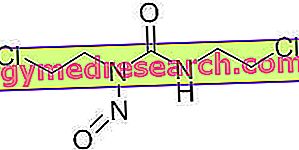Carmustine - or BCNU (bis-cloronitrosourea) - is an anticancer drug belonging to the class of alkylating agents.

Carmustina - Chemical Structure
It is a lipophilic compound that easily passes the blood-brain barrier, which is why it is widely used to treat brain tumors.
Indications
For what it uses
Carmustine is indicated in the treatment of:
- Brain tumors (glioma, glioblastoma multiforme, medulloblastoma, astrocytoma);
- Multiple myeloma;
- Hodgkin's lymphoma;
- Non-Hodgkin's lymphoma.
Warnings
Carmustine should only be administered under the strict supervision of a doctor who specializes in the administration of chemotherapeutic antineoplastic drugs.
Since carmustine can cause delayed bone marrow toxicity, it is necessary to monitor bone marrow function - through haematological examinations - for a period of at least six weeks after the administration of each dose.
Because of its toxicity, monitoring of liver and kidney function is also required throughout the drug treatment period.
Interactions
Carmustine may decrease the plasma concentration of phenytoin (a drug used to treat epilepsy), thereby reducing its therapeutic efficacy.
Concomitant administration of carmustine and mitomycin (an antibiotic that has anticancer activity) causes qualitative and quantitative changes of the corneal film, with consequent damage to the corneal and conjunctival epithelium.
The simultaneous intake of carmustine and cimetidine (a drug used in the treatment of gastric ulcer) may increase the toxicity of the bone marrow of carmustine itself.
Side effects
Carmustine induces various side effects. These effects vary according to the pathology to be treated, the dose of drug administered and according to the patient's condition. Furthermore, there is a great variability in the response to therapy between one individual and another, so it is not said that the side effects occur all with the same intensity in each patient.
Gastrointestinal disorders
Carmustine can cause nausea, vomiting and diarrhea .
Vomiting occurs a few hours after taking the drug and can last up to two or three days. This symptom is controlled with the use of anti-emetic drugs. If vomiting persists, you must inform your doctor.
Diarrhea can be treated with anti-diarrheal drugs and it is necessary to drink a lot to replenish lost fluids.
Myelosuppression
Carmustine can cause myelosuppression, which is the suppression of bone marrow activity. This suppression causes reduced production of all blood cells which can lead to:
- Anemia (decrease in hemoglobin blood levels), the main symptom of the onset of anemia is the feeling of physical exhaustion ;
- Leukopenia (decreased white blood cell levels), with increased susceptibility to contraction of infections ;
- Plateletopenia (decrease in the number of platelets), this leads to the appearance of bruising and abnormal bleeding with an increased risk of bleeding .
Above all, the drug promotes the onset of marked leukopenia and thrombocytopenia.
Carmustine may also cause delayed bone marrow toxicity .
Loss of appetite
Carmustine treatment can lead to loss of appetite and body weight . The drug can also cause metabolism and nutrition disorders .
Reduction of liver function
Carmustine therapy may cause a temporary reduction in liver activity . However, liver function should normalize at the end of treatment.
Lung changes
Carmustine therapy may cause a change in lung tissue . It is essential to inform the oncologist if coughing and / or shortness of breath occur.
Infertility
Carmustine can affect the ability to conceive.
Renal and urinary disorders
Carmustine treatment can cause urinary tract infections and incontinence .
Pathologies of the central nervous system
Carmustine therapy can cause confusion, convulsions, cerebral edema, depression, drowsiness, dizziness and speech disorders . When carmustine is used in the form of implant wafers, epileptic seizures can occur. However, these convulsions seem to be caused by the implant itself and not by the drug.
Other side effects
Carmustine treatment can also cause walking difficulties, visual changes and eye pain . These side effects are quite rare, but - if they occur - the oncologist must be informed immediately.
Action mechanism
Carmustine is a nitrosourea belonging to the class of alkylating agents. The drug is highly unstable, quickly decomposes within the cellular aqueous environment giving rise to active compounds that possess cytotoxic activity (toxic to cells). These compounds are capable of intercalating alkyl groups within the double DNA strand. The changes induced on the DNA molecule prevent the cell from replicating properly and send it to apoptosis (a mechanism of programmed cell death).
Mode of Use - Posology
Carmustine is available for intravenous administration or as an implant wafer.
Carmustine for intravenous administration appears as a dry powder that must be dissolved in an adequate amount of solvent before infusion. It can be administered:
- By injection into a vein through a cannula (a thin tube) that is inserted into a vein of an arm or hand;
- Through a central venous catheter that is inserted subcutaneously into a vein near the clavicle.
The dosage is established by the oncologist according to the tumor to be treated and the patient's condition.
Regarding carmustine in the form of an implant, this is used for the treatment of brain tumors. In particular, the implant is inserted into the brain following surgical removal of the tumor or as an aid to radiotherapy.
Pregnancy and breastfeeding
Carmustine treatment during pregnancy is not recommended because the drug can cause harm to the developing fetus.
During carmustine therapy and for a certain period of time from the end of the same, it would be good to adopt precautions - by both sexes - to avoid any pregnancies.
Mothers receiving carmustine should not breast-feed.
Contraindications
The use of carmustine is contraindicated in the following cases:
- Known hypersensitivity to carmustine;
- Pregnant;
- During breastfeeding.



